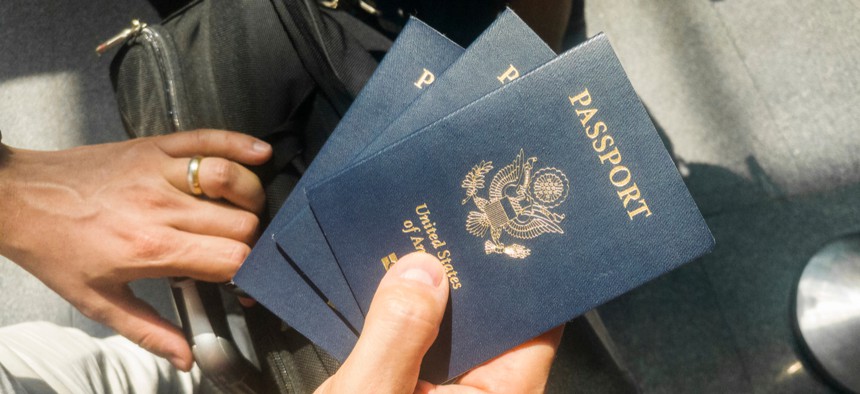
Shutterstock.com
Passport Processing at State Slows as Staffing Levels Fall
Beleaguered workers with fewer resources are struggling to keep pace with a record number of passport applications.
The State Department office responsible for processing passports is “woefully understaffed,” according to employees in the Bureau of Consular Affairs and internal government data, leading to the longest delays in passport processing data in more than a decade.
An 86% increase in the backlog of passport applications over the last two years has coincided with a 14% reduction in staffing of the passport specialists who process and approve the documents, according to internal State data provided to Government Executive. These factors have led to a dramatic 200% spike in the average time a passport application spends in the Bureau of Consular Affairs processing offices. That led State earlier this year to increase the average expected wait time for a normal, non-expedited passport request from 4-6 weeks to 6-8 weeks.
There are currently about 1 million passport applications awaiting processing, a significant increase over the backlog in August of previous years. Overall demand for passports has climbed 36% over the last three years, though Consular Affairs has shed about 200 passport specialists in that time. Routine applications are sitting in Consular Affairs offices for about 16 days, which does not account for time spent mailing documents back and forth and in a contract facility to catalogue the information. That's among the highest average processing times since at least 2007.
The workforce is exasperated and exhausted, according to Rob Arnold, president of the National Federation of Federal Employees chapter that represents most passport specialists nationwide. State began instituting mandatory overtime in 2017 to address what it told employees would be a temporary surge in demand, but has continued the requirement into 2018 and 2019.
“Management is aware that everyone is getting burned out,” said Arnold, a passport specialist for more than 20 years.
In 2017 when passport applications started to spike, State implemented a number of “resiliency” initiatives to help workers deal with the added strain, including management meet-and-greets and casual dress days. Officials also deployed “Passport Pete,” a stuffed porcupine mascot, to regional offices for photo opportunities and activities. Two years later, those efforts have paid few dividends as processing offices continue to hemorrhage employees.
The current situation has created a cycle in which employees spend more time communicating with applicants to provide status updates—under normal conditions, employees have no communication with applicants before delivering the passport—and tracking down which applications need to be prioritized. At in-person offices, applicants are waiting in lines that can stretch around the block, Arnold said, leading to a “crankier bunch” that interfaces with employees and thus creates a more hostile work environment.
Additionally, employees feel more pressure to get more passports out the door faster, creating the risk of more errors. Employees, who are responsible for memorizing a 1,200-page foreign affairs manual in making passport eligibility determinations, are held to standards in which a certain number of errors can lead to more intense scrutiny of their work, placement on a performance improvement plan and, eventually, dismissal.
“There’s certainly more stress when the backlog is getting out of control,” Arnold said.
While the number of processors has declined, the number of Americans seeking passports has continued to climb to all-time highs. State issued more than 21 million passports in each of the last two years, a record number. There are currently 137.5 million passports in circulation, an increase of nearly 100% over the last decade. Still, the department has failed to keep its passport specialist workforce from falling.
The Bureau of Consular Affairs recently told the State inspector general its passport agencies were “critically understaffed at a time when passport issuance increased to an all-time high.” Due to a 16-month hiring freeze at the department instituted shortly after President Trump took office, the bureau turned to “methods that were either more expensive than hiring regular staff or that degraded long-term planning, training and staff development,” the IG said.
Consular affairs has, for example, increasingly relied on student interns to process passports. This has led to supervisors focusing “almost exclusively” on monitoring the interns, the IG said, “at the expense of other supervisory duties.” Arnold suggested the interns could not be expected to produce the same quality of work as full-time, trained experts.
“It’s hard to imagine how someone is carrying a full load of classes and memorizing thousands of passports regulations they have to keep track of,” he said.
While Consular Affairs conceded to the IG it has struggled to fill positions even after State lifted the hiring freeze last year, a department official said it is making progress.
“Consular Affairs is recruiting and hiring additional required full-time staff, utilizing all available hiring authorities to bring new employees on board,” the official said, adding the impact of those efforts would be delayed due to the lengthy background check and training process.
The official said State has expanded hours at its National Passport Information Center and hopes to restore the processing time to its normal schedule by September.
“We take seriously our responsibility to protect U.S. borders through the vigilant adjudication of U.S. passport applications,” the official said. “The U.S. Department of State is committed to providing the highest levels of customer service, and we are issuing record numbers of passports to facilitate U.S. travel abroad.”







